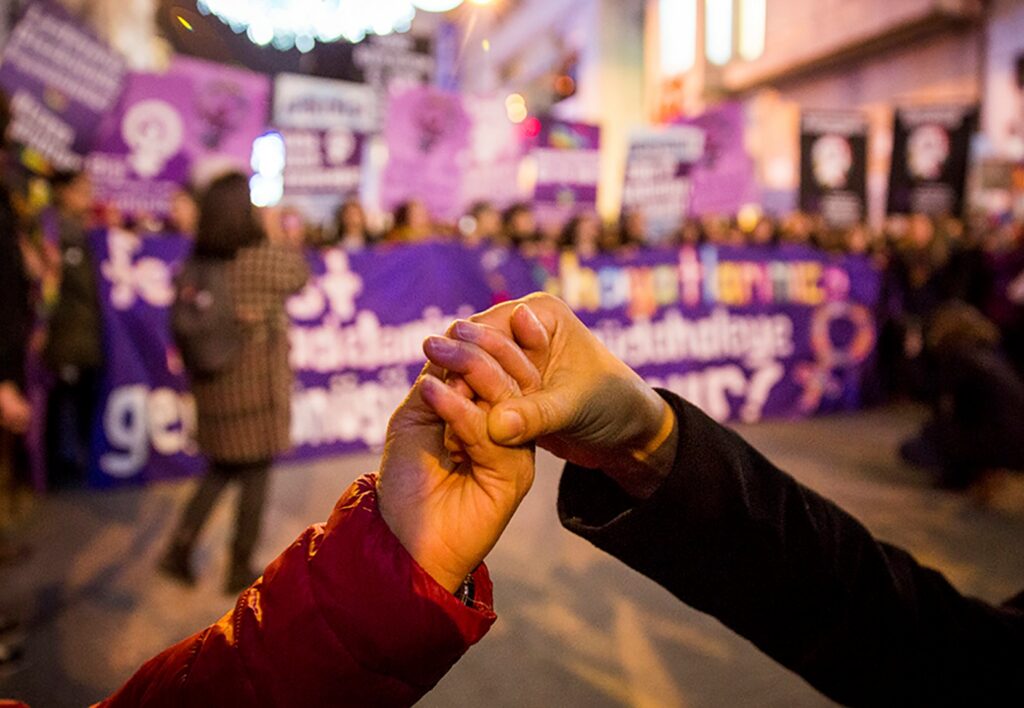WLUML Spotlight: Türkiye’s Withdrawal from the Istanbul Convention
On 20th March, Türkiye’s withdrawal announcement two years ago from the Istanbul Convention on preventing and combating violence against women and domestic violence continues to be a cause for concern. Violence against women including femicide remains a problem in the country. McGill law Professor Vrinda Narain sounds the call for Türkiye to reverse its decision.
Türkiye’s unilateral withdrawal from the Istanbul Convention − the Council of Europe’s Convention on Preventing and Combating Violence Against Women and Domestic Violence − in March 2021 has resulted in a critical setback for women and girls’ human rights in Türkiye.[1] On this International Women’s Day, two years later, we continue to call on the Turkish government to reverse its decision to withdraw from the Istanbul Convention.
The Istanbul Convention is the world’s first comprehensive and binding treaty intended to prevent and prosecute all forms of violence against women and gender-based violence including domestic violence, sexual harassment, sexual violence, forced marriages, and forced abortions and sterilizations.[2] Its goal is to strengthen national and international policies to eliminate all forms of violence against women in the private and the public spheres and to take steps to realize gender equality. The Convention also encourages state parties to implement its provisions in cases of gender, race, sexual orientation, and age-based violence and discrimination.[3]
Ironically, Türkiye had the distinction of being the first country to sign the Istanbul Convention on 11 May 2011, which came about as a result of Turkish women’s fight for equality. According to constitutional experts, the presidential decree to withdraw was made in defiance of the Turkish Constitution and demonstrates the erosion of the rule of law in Türkiye during President Erdoğan’s regime.[4] The withdrawal decision was consequently challenged in the courts. Over 200 appeals were filed in the top administrative court to invalidate the President’s decision.[5] The hearing at the State Council was the most crowded in the history of the administrative court, with over 500 people in attendance, and others barred from entering the conference hall due to police obstruction.[6]
It is particularly concerning that this decree was issued during a pandemic and lockdown that has left many women, children, and members of the LGBTQ+ community particularly vulnerable to violence.[7] When Türkiye’s presidential decree to withdraw was first reported, the UN Special Rapporteur on violence against women, the Chair of the Committee on the Elimination of Discrimination against Women, and other UN and regional human rights experts published a joint statement expressing “deep regret” at President Erdoğan’s decision.[8] The UN experts specifically cited the “increased risk of violence against women” in the context of COVID-19, and the Special Rapporteur noted how the decision “sends a dangerous message that violence against women is not important, with the risk of encouraging perpetrators and weakening measures to prevent it.”[9]
Numerous studies, including those conducted by UN agencies, have shown that domestic violence and harassment against women has increased in most parts of the world, including Türkiye.[10] Femicides are also on the rise.[11] According to the 2022 annual report published by Turkish feminist organization, We Will Stop Femicide Platform (Kadın Cinayetlerini Durduracağız Platformu), 334 women were murdered by men in Türkiye last year.[12] At a time when diverse global women’s rights and feminist groups are working across borders for stronger norms, laws, and policies for gender justice and safety, the Turkish government has turned its back on essential and important measures that many fought for in the decades prior. It is profoundly disturbing that, in recent years, the Convention has been the target of disinformation campaigns in and beyond Türkiye, in which this seminal instrument to protect women’s rights and lives has been misleadingly framed as “normalizing homosexuality,” and “incompatible with Türkiye’s social and family values.”[13]
In May, in the wake of devastating earthquakes and heightened concern over executive power overreach,[14] Türkiye’s voters will once again make a pivotal decision about who will lead the country and what will be on the country’s agenda in the coming years. Kemal Kilicdaroglu, chair of the Republican People’s Party and the official opposition challenger to President Erdoğan, has been vocal about his commitment to reintroducing the Istanbul Convention should his party come to power.[15] Whatever the outcome of what has been described as “the most consequential election in the republic’s 100-year history,”[16] Türkiye must reconsider this decision and honour the country’s international obligations to recognize and affirm women’s rights. The Council of Europe must investigate the legality of Türkiye’s withdrawal from the Istanbul Convention from an international law perspective[17] and the international community must take concrete action to persuade Türkiye to reverse its decision.
About the author: Vrinda Narain is a professor at McGill University. Her research and teaching focus on constitutional law, social diversity and feminist legal theory. She is also a WLUML Board member.


